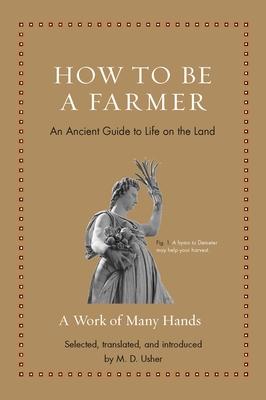A delightful anthology of classical Greek and Roman writings celebrating country living--ranging from a philosophy of compost to hymns to the gods of agriculture
Whether you farm or garden, live in the country or long to move there, or simply enjoy an occasional rural retreat, you will be delighted by this cornucopia of writings about living and working on the land, harvested from the fertile fields of ancient Greek and Roman literature. An inspiring antidote to the digital age, How to Be a Farmer evokes the beauty and bounty of nature with a rich mixture of philosophy, practical advice, history, and humor. Together, these timeless reflections on what the Greeks called boukolika and the Romans res rusticae provide an entertaining and enlightening guide to a more meaningful and sustainable way of life. In fresh translations by classicist and farmer M. D. Usher, with the original texts on facing pages, Hesiod praises the dignity of labor; Plato describes the rustic simplicity of his ideal republic; Varro dedicates a farming manual to his wife, Fundania ("Mrs. Farmer"); and Vergil idealizes farmers as residents of the Golden Age. In other selections, Horace extols the joys of simple living at his cherished country farm; Pliny the Elder explains why all culture stems from agriculture; Columella praises donkeys and tells how to choose a ram or a dog; Musonius Rufus argues that farming is the best livelihood for a philosopher; and there is much more. Proof that farming is ultimately a state of mind we should all cultivate, How to Be a Farmer will charm anyone who loves nature or its fruits.
Book
How to Be a Farmer: An Ancient Guide to Life on the Land
(Write a Review)
Hardcover
$16.95
A delightful anthology of classical Greek and Roman writings celebrating country living--ranging from a philosophy of compost to hymns to the gods of agriculture
Whether you farm or garden, live in the country or long to move there, or simply enjoy an occasional rural retreat, you will be delighted by this cornucopia of writings about living and working on the land, harvested from the fertile fields of ancient Greek and Roman literature. An inspiring antidote to the digital age, How to Be a Farmer evokes the beauty and bounty of nature with a rich mixture of philosophy, practical advice, history, and humor. Together, these timeless reflections on what the Greeks called boukolika and the Romans res rusticae provide an entertaining and enlightening guide to a more meaningful and sustainable way of life. In fresh translations by classicist and farmer M. D. Usher, with the original texts on facing pages, Hesiod praises the dignity of labor; Plato describes the rustic simplicity of his ideal republic; Varro dedicates a farming manual to his wife, Fundania ("Mrs. Farmer"); and Vergil idealizes farmers as residents of the Golden Age. In other selections, Horace extols the joys of simple living at his cherished country farm; Pliny the Elder explains why all culture stems from agriculture; Columella praises donkeys and tells how to choose a ram or a dog; Musonius Rufus argues that farming is the best livelihood for a philosopher; and there is much more. Proof that farming is ultimately a state of mind we should all cultivate, How to Be a Farmer will charm anyone who loves nature or its fruits.Hardcover
$16.95